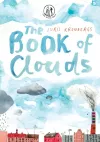
The Book of Clouds
Juris Kronbergs - Hardback
£12.00
Juris Kronbergs was born in Sweden in 1946, his parents having fled as wartime refugees from Latvia the previous year. He is a poet, translator, freelance journalist and lecturer and has also worked in radio and as a Latvian-Swedish interpreter for the Swedish government and the Nordic Council of Ministers. He has served in the Latvian diplomatic service for ten years as the Latvian Cultural Attache in Stockholm. He translates freely from Latvian to Swedish as well as Swedish to Latvian and has been instrumental in the introduction of all the major Latvian contemporary poets to Swedish readers as well as a great number of Swedish poets to a Latvian readership. His thirty translated books that have been published to critical acclaim in Sweden and Latvia include folksongs, novels and memoirs as well as poetry anthologies and for his services to the literature and culture of both countries he has received numerous awards including the Three Star Order from Latvia and the Swedish North Star Order. He has had eleven collections of his own poetry published in Latvia and one collection in Sweden. In its original version, Wolf One-Eye was awarded the Latvian Writers' Union prize in 1997 for best poetry collection. The present version is revised and contains a substantial body of new work. Mara Rozitis was born in Sydney, Australia in 1952 to parents who were refugees from Latvia during the Second World War. She studied drama at Flinders University, South Australia and in 1980 she moved to Sweden to study Baltic Languages at Stockholm University. She has worked as an actress and theatre director, has written a number of playscripts in Latvian, worked in Swedish radio and is currently teaching English in a primary school in Stockholm. She has translated a number of Latvian poets into English. Jaan Kaplinski (b.1941) is one of Estonia's best-known writers and an influential member of society. He is known particularly as a poet, essayist and as an active participant in cultural debate. His works have been translated into several languages. The philosophical poetry of Kaplinski is influenced by both western modernism and classical Chinese poetry and philosophy. Kaplinski studied philology and linguistics at the University of Tartu from where he graduated in 1964. He has worked as a researcher in linguistics, sociology and ecology and has translated poetry from many languages into Estonian.